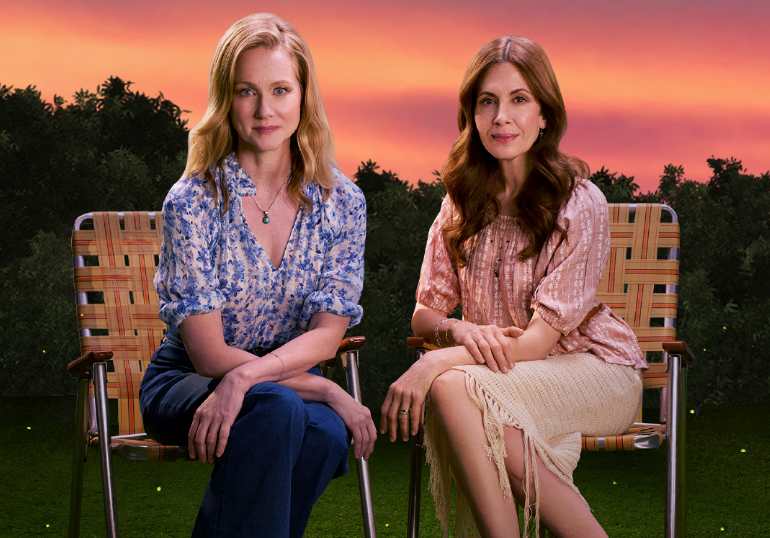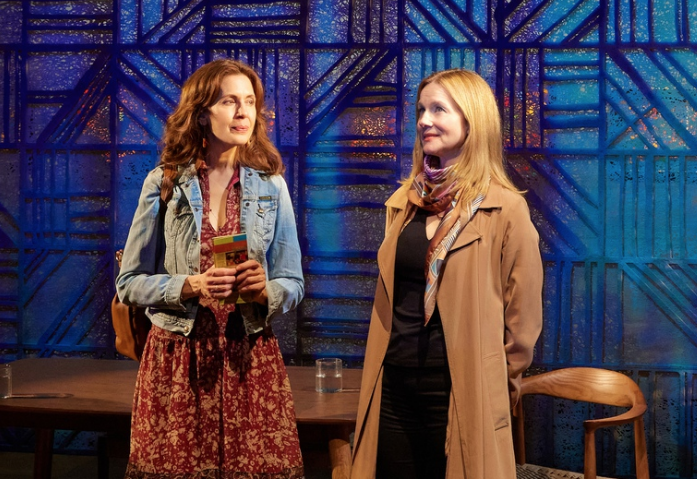Stage Door: Great actressing in "Summer 1976"
 Monday, May 15, 2023 at 5:00PM
Monday, May 15, 2023 at 5:00PM by Nathaniel R

It begins with a gesture. Twinned gestures, really, though they’re not identical. Laura Linney and Jessica Hecht enter from stage right and stage left, respectively and face the audience. Linney’s hand sweeps away from her body presentationally to the audience, It’s a fun and curious movement as if to say ‘here you are and here we are’ at once. There’s a sharp edge to it, though. Is it mocking and, if so, who is the target? Hecht soon makes a similar gesture, though the body language is sloppier with a ‘whatever’ nonchalance. And we’re off.
The two actresses begin to recount the story of how two very dissimilar mothers, Diana (Linney) and Alice (Hecht) met and how they improbably became close friends…
Free babysitting, that undeniable siren for exhausted parents, is what first brings them together. Their daughters, Gretchen and Holly, are unseen as just two actors grace the stage. The instant friendships the little girls form isn’t mirrored in their mothers who don’t like what they initially see. Diana, with her practiced posture, big vocabulary, instant judgments, and frequent aesthetic pronouncements is easy to peg; she’s an academic, an artist, and a snob. Alice is a little tougher to pin down, despite being less complicated: she’s either a dim housewife and/or a free-spirited hippie who just isn’t interested in intellectualizing anything.
Linney and Hecht, very different hugely talented regulars of the Broadway stage with over 20 plays between them, are contagiously invested in the material. They harmonize beautifully like an alto and soprano in a sprawling unpredictable duet breezing hrough multiple styles of music.
Linney, the consummate ever watchable star reminds us once again of her estimable gift with scale; she’s one of those rare actors who is equally thrilling no matter the size of the actor's medium: big screen, tv, stage. Her Diana is funny and maddening but Linney finds ways to pull the rug out from under you even while staying predictable and true to her character's rigidity. An erotic reverie monologue halfway through the play delivers in a big way.
Hecht, less mainstream heralded but well-loved by those who follow her work, is gifted here with the more likeable character. She's having a ball with Alice making big vocal choices and managing often surprising spur of the moment feeling even though the play is proudly theatrical rather than naturalistic in its scene-work. Alice is frequently stoned and Hecht sells that superbly while never missing a beat in the performative gymnastics that the material requires. She's also hilarious, particularly when she lets Alice's self-awareness lag behind the audiences, as in perfectly judged punchline to a play-long aside about her professor husband's financial model for their babysitting network.

David Auburn’s writing is elegant in both its broad comic gestures and its emotional intricacies. First impressions are not nothing but they aren’t everything. Summer 1976 reminds us of this fact as it deepens both characters and complicates our initial feelings throughout its uninterrupted 90 minutes. Auburn’s most famous play, 2001’s Pulitzer and Tony winner Proof, dealt with mathematicians and madness. His latest isn’t as heady or devastating, leaning as it does into comedy. Still it has a precision and fluidity in its mostly linear structure that would surely impress a mathematician (even as they're laughing at the ecomic model jokes). The actresses weave in and out of the plays storytelling, which shifts constantly frm direct address, to scene reenactments, to role switching or role play (a repeated comic highlight is when the actresses mock each other's voices or speak for Alice's husband).
There are plentiful laughs but Summer 1976 also packs a stealth punch. The final scenes flash forward, as they must. Summers inevitably end too soon, and not all friendships last. The expressive projection design and lighting, which subtly shift the smart minimalist set throughout for scene work, never quite draw attention to themselves until the end when we're inside a museum and many years have passed. The two women are reunited. Here they are now but not the way they were.
Summer 1976 is up for one Tony Award (Best Actress, Jessica Hecht) and plays through June 18th at the Samuel J Friedman Theatre in NYC.



Reader Comments (2)
This sounds wonderful. I hope a performance is taped for us to relish at a later date.
Saw it several weeks ago and loved, loved it.
The moment that sticks with me is when Alice snaps back after Diana criticizes her reading habits by the pool. Diana—the inveterate lecturer—gets schooled on emotional intelligence by someone who’s every bit as smart as her but much wiser, much better at enjoying life, picking her battles, dealing with people.